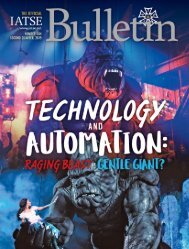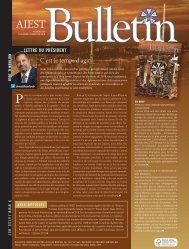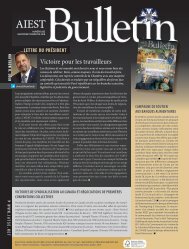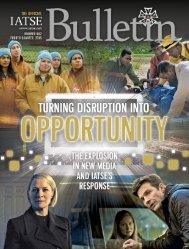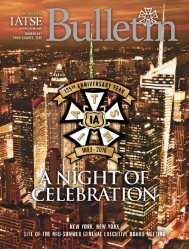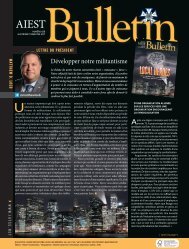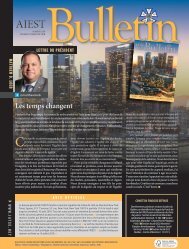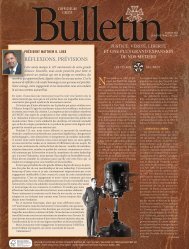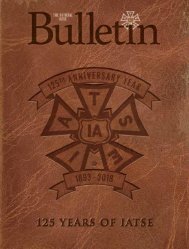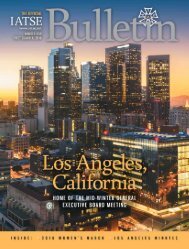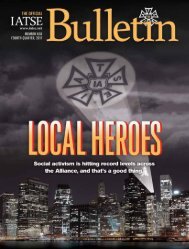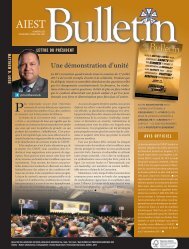IATSE_3rd2017_web
You also want an ePaper? Increase the reach of your titles
YUMPU automatically turns print PDFs into web optimized ePapers that Google loves.
However, in other areas around the<br />
country fewer broadcast workers enjoy<br />
union representation, putting the hardearned<br />
living standards of our members<br />
at risk. In America’s competitive broadcast<br />
marketplace, employers have tremendous<br />
economic incentives to outsource<br />
work, cut pay, and cut benefits. In some<br />
areas, our broadcast members are competing<br />
with non-union employers offering<br />
poverty wages. The only solution is to<br />
grow the <strong>IATSE</strong>’s influence by organizing<br />
these unorganized workers. I am pleased<br />
to report that against this background,<br />
our Broadcast Department representatives<br />
have skillfully served our members,<br />
organized more work, and negotiated respectable<br />
contracts.<br />
<strong>IATSE</strong> broadcast Locals representing<br />
workers in traditional television stations<br />
have faced a wide range of obstacles<br />
during the last four years. Decentralization<br />
of television distribution because<br />
of the internet has produced new generations<br />
of consumers known as “cord<br />
cutters” (people who have opted out of<br />
standard cable television subscriptions)<br />
and “cord nevers” (those who never<br />
had standard subscriptions). Because of<br />
these trends, market share for local television<br />
news has decreased. In response,<br />
many stations have embarked upon<br />
rounds of cost-cutting measures that<br />
often include technical automation and<br />
job reductions. Employers have plotted<br />
ways to pool news content from multiple<br />
stations rather than dedicating their<br />
local news to one specific region. Much<br />
like similar efforts in print journalism,<br />
this practice could lead to local news<br />
roundups, a practice sometimes called<br />
“commodity news.” Employers have<br />
also explored “hubbing” (consolidating<br />
job functions at central locations) and<br />
sought to eliminate the Union’s exclusive<br />
jurisdiction. Collectively, these schemes<br />
and practices have led to employment<br />
cuts and increased workloads for remaining<br />
<strong>IATSE</strong> employees.<br />
Local news companies have experimented<br />
with smartphone apps to encourage<br />
freelance paparazzi shooters to cover<br />
breaking stories. These events are then<br />
broadcast digitally. If the shooters’ footage<br />
is used, they are paid a flat rate. The<br />
<strong>IATSE</strong>, which has a long history of representing<br />
news photographers and photojournalists,<br />
has been battling against this<br />
practice with multiple employers.<br />
Along with the changing nature of TV<br />
news, another major event threatening to<br />
disrupt historic broadcast trends is the<br />
Federal Communication Commission’s<br />
(FCC) auction of portions of over-the-air<br />
television broadcast spectrum. The FCC’s<br />
efforts will reallocate portions of the television<br />
broadcast spectrum to the telecom<br />
industry for use by mobile devices and to<br />
provide the bandwidth for the introduction<br />
of fifth generation wireless systems<br />
(i.e., “5G”). These changes will revolutionize<br />
the so-called internet of things<br />
and usher in new levels of personal automation.<br />
Users will be connected to a vast<br />
array of media devices that anticipate the<br />
needs and patterns of users. It will also<br />
allow for direct distribution of content,<br />
which may disrupt current distribution<br />
models. <strong>IATSE</strong> broadcast officials have<br />
predicted that some local TV stations<br />
may go off the air and instead transition<br />
exclusively to internet distribution. This<br />
transfer of public airwaves into private<br />
hands will have long lasting consequences<br />
for individuals working on local and regional<br />
broadcasts. Many broadcasters<br />
have engaged in hard bargaining and<br />
evaded deals on successor contracts with<br />
<strong>IATSE</strong> Locals until the spectrum auction<br />
is over. This has forced our Locals to continually<br />
fight to maintain <strong>IATSE</strong> standards<br />
in this area. IA members working<br />
at local stations have seen some progress<br />
in the last year after engaging communities<br />
(through town hall meetings and<br />
political activism) with dogged determination.<br />
These efforts led to staffing guarantees<br />
and wage increases for broadcast<br />
members working on the West Coast.<br />
Freelance remote broadcast employees<br />
working on regional sports networks—many<br />
of whom have now been<br />
represented by the <strong>IATSE</strong> for years—<br />
enjoy some of the best wages and benefits<br />
in the industry. The broadcast Locals<br />
involved in remote sports events now<br />
bring content to air for fifty-two professional<br />
sports teams, including members<br />
of Major League Baseball, the National<br />
Hockey League, Major League Soccer,<br />
the National Basketball Association, and<br />
the Women’s National Basketball Association.<br />
Along with these professional<br />
sporting events, IA Locals cover certain<br />
National Football League events; semi—<br />
professional, college, and international<br />
soccer; boxing and other fighting events;<br />
collegiate sports; tennis; golf; and other<br />
assorted sporting events. Over a decade<br />
ago, when the IA began expanding its<br />
jurisdiction in the broadcast industry, it<br />
represented freelance sports broadcast<br />
technicians working under five contracts.<br />
Today, the <strong>IATSE</strong> has forty-seven contracts<br />
with employers involved in live<br />
sports content.<br />
70 OFFICIAL BULLETIN




